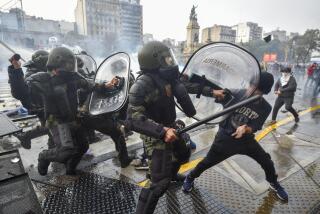Congress Picks New President for Argentina
- Share via
BUENOS AIRES — With Argentina teetering on the brink of anarchy, a congressional alliance of major parties moved with rare cohesion Tuesday and named Sen. Eduardo Duhalde as the nation’s fifth president in less than two weeks.
Duhalde was nominated to the office Tuesday by his Peronist party, which controls both houses of Congress. He was elected late Tuesday at a combined session of the Senate and Chamber of Deputies by an overwhelming vote of 262 to 21, with 18 abstentions.
In a bid to restore stability in a nation jolted by mass demonstrations, rioting and a leadership crisis, Duhalde was given a two-year term. He will be sworn in today.
Duhalde received support from the Radical and Frepaso parties, which in turn are expected to receive seats in his new Cabinet. Most of Argentina’s provincial governors also huddled here Tuesday, negotiating terms of their support.
The final vote was all but a formality after legislators formed a New Year’s Day consensus around Duhalde. The urgency of the situation was underscored by clashes during the day among thousands of political partisans outside the congressional palace as senators and deputies deliberated inside. Police used tear gas to break up the melees.
There were those who refused to jump on the Duhalde bandwagon, insisting that elections be held in early March as announced after the Dec. 20 resignation of President Fernando de la Rua. One such holdout was Jose Manuel de la Sota, influential governor of Cordoba province and a presidential candidate.
But Congress apparently feared that the political weakness in the government and the chaos in the streets--which marked the weeklong rule of one of De la Rua’s successors, interim President Adolfo Rodriguez Saa--would continue under another short-term caretaker government. Rodriguez resigned Sunday following demonstrations against his economic proposals and his Cabinet appointees, some of whom were tainted by corruption charges.
“Duhalde is our only alternative. After that, the precipice,” said Alejandro Groh, an office worker who demonstrated in front of Congress on Tuesday in favor of the 60-year-old Peronist senator, who served two terms as governor of Buenos Aires province.
Argentina has been slowly bowing under the weight of a crushing foreign debt, a four-year recession, rising unemployment and mounting public disaffection with its leaders. An outburst of rioting forced the resignation of De la Rua two years into his four-year term. The protests have drawn middle-class citizens who took to the streets clanging pots and pans.
Rodriguez had proposed defaulting on Argentina’s $132-billion debt and introducing a new currency in addition to the existing peso, a move that economists warned would lead to hyperinflation.
Duhalde’s economic plans were not clear Tuesday night and were said to be a subject of negotiations among the various congressional parties. He is expected to lay out a recovery package this week. His supporters have dubbed his administration the “National Salvation Government.”
Abel Viglione of the Fiel think tank here believes Duhalde will continue Rodriguez’s “posture” of favoring a default on some if not all of Argentina’s public debt, since he ran on such a platform in the 1999 presidential election. Duhalde finished second in the contest to De la Rua.
Peronist Deputy Carlos R. Brown, who is close to Duhalde, said the incoming president will introduce a new currency but “with care and not as a devaluation in disguise.” The peso is now pegged to the dollar.
Several sources said they expect Duhalde to reject the idea of a new currency in favor of issuing about $3 billion in short-term vouchers with which the government would pay public employees a portion of their salaries, adding liquidity to Argentina’s shrinking economy.
Rodriguez was to have served until a March presidential election. His brief term was a compromise among fiercely competing interests seeking power in the aftermath of De la Rua’s resignation. Former President Carlos Menem has already announced that he will run for the presidency in 2003.
But Rodriguez’s rapid exit taught Congress that a new president should have more time to impose a recovery plan, Brown said.
“With the nation in the current crisis, we don’t have the luxury of changing presidents every 60 days,” Brown said. “It’s an imperative that the new president have the power and the majority to put his program in place and see it through.”
How Argentines at large will accept Duhalde, who was vice president from 1989 to 1991, remains to be seen. His two terms as governor of Buenos Aires province were tainted with charges of corruption. But he was elected to the Senate in October by a large majority.
Duhalde will serve out the remainder of De la Rua’s term, which was scheduled to end Dec. 10, 2003.
“The experience of the last 10 days has showed us that we can’t wait to give a president the power to take the measures needed,” said a staff worker for the Radical party, one of Argentina’s largest opposition parties.
Dario Alessandro, chief of the Frepaso party, said in a statement throwing the group’s support behind Duhalde that the current situation makes it “necessary to find an institutional solution to the problems that affect our country.”
Since Dec. 21, two members of Congress also served--very briefly and reluctantly--as president in addition to Rodriguez. Senate leader Ramon Puerta inherited the job when De la Rua quit, and Chamber of Deputies leader Eduardo Camano took office after Rodriguez resigned. However, both made it clear that an extended term did not appeal to them.
More to Read
Sign up for Essential California
The most important California stories and recommendations in your inbox every morning.
You may occasionally receive promotional content from the Los Angeles Times.













